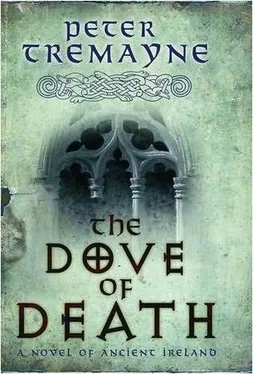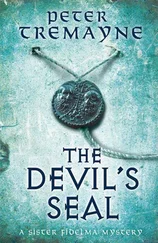Peter Tremayne - The Dove of Death
Здесь есть возможность читать онлайн «Peter Tremayne - The Dove of Death» весь текст электронной книги совершенно бесплатно (целиком полную версию без сокращений). В некоторых случаях можно слушать аудио, скачать через торрент в формате fb2 и присутствует краткое содержание. Жанр: Исторический детектив, на английском языке. Описание произведения, (предисловие) а так же отзывы посетителей доступны на портале библиотеки ЛибКат.
- Название:The Dove of Death
- Автор:
- Жанр:
- Год:неизвестен
- ISBN:нет данных
- Рейтинг книги:5 / 5. Голосов: 1
-
Избранное:Добавить в избранное
- Отзывы:
-
Ваша оценка:
- 100
- 1
- 2
- 3
- 4
- 5
The Dove of Death: краткое содержание, описание и аннотация
Предлагаем к чтению аннотацию, описание, краткое содержание или предисловие (зависит от того, что написал сам автор книги «The Dove of Death»). Если вы не нашли необходимую информацию о книге — напишите в комментариях, мы постараемся отыскать её.
The Dove of Death — читать онлайн бесплатно полную книгу (весь текст) целиком
Ниже представлен текст книги, разбитый по страницам. Система сохранения места последней прочитанной страницы, позволяет с удобством читать онлайн бесплатно книгу «The Dove of Death», без необходимости каждый раз заново искать на чём Вы остановились. Поставьте закладку, и сможете в любой момент перейти на страницу, на которой закончили чтение.
Интервал:
Закладка:
For a moment an expression of pride crossed the young man’s features.
‘I was born and educated in Constantinopolis.’
‘Then I leave Eadulf in your hands, Heraclius. Be sure to send for me, if anything is amiss.’
‘Have no worries, lady. He will be well soon.’
Fidelma turned and followed the waiting female attendant along the panelled corridor again to the stairway. The interior of the building was almost entirely of wood, with the exception of a stone tower and lower foundations. There were outer walls of sandstone which surrounded the large two-storey building. It was an impressive place and Fidelma had seen few buildings to compare with it. It was, in many respects, reminiscent of structures she had seen in Rome.
‘This is a magnificent building,’ she commented to the attendant. The girl bobbed nervously.
‘Indeed, lady.’
‘And old?’
‘They say that a Roman governor, sent to rule over the Veneti many years ago, had it built as a summer palace.’
Fidelma congratulated herself. So that explained the similarity that she had felt between this villa and some of the buildings she had seen in Rome. However, Roman residences were not usually built with second storeys and watchtowers, so she presumed that much had been added to the building over the years. From the bottom of the stairway, the attendant led her along a corridor and through a door which entered on a typical Roman-style inner courtyard with what might once have been a fountain but which no longer gushed water. On the far side of this courtyard, the attendant opened a carved oak door and ushered Fidelma inside.
Trifina received her in a large chamber. A fire was blazing in the hearth at the far end and oak chairs were set on either side. There was a similarly ornate table laid with various dishes and jugs, and Trifina waved towards it.
‘There is mulled wine or soup to choose from. Take what you will,’ she invited. ‘Something warm will help you recover from your ordeal.’
Fidelma took a goblet of mulled wine and went to the seat by the fire indicated by Trifina.
The daughter of the mac’htiern of Brilhag stretched herself in the second comfortable chair and examined Fidelma carefully from under lowered lids.
‘You did not really make your journey here just to bring me news, did you?’ she opened. It was not said as an accusation but a confident statement seeking an expected confirmation.
Fidelma decided to be honest.
‘Not entirely,’ she admitted. ‘Although it is true that Riwanon has arrived and that Macliau is not at Brilhag. It is also true that Abbot Maelcar has been murdered.’
Trifina continued her close scrutiny but without expression,
‘But that is not what brought you on your foolhardy voyage here, is it? Let us start, though, with the death of the Abbot. Who murdered him — and why?’
‘We do not know. At the moment, the only suspect seems to be Iuna.’
Trifina’s eyes widened in surprise.
‘Iuna? Abbot Maelcar was not the friendliest of men and his attitude certainly made him many enemies locally. However, I can’t believe…Iuna. Why?’
‘I found her fleeing from Abbot Maelcar’s bedchamber. She said that she had discovered the body a moment before. I do not think she told me the entire truth. Then I saw her leaving the fortress with Iarnbud in a small sailing boat. They were heading in this direction. Hence, Eadulf and I followed.’
At this, Trifina’s expression turned to one of incredulity. ‘Iarnbud and Iuna? You are mistaken.’
‘I am not. Abbot Maelcar said that he had come to Brilhag in answer to a plea, which was purportedly sent by the King. But it was clear, at once, that no such message came from the King or your father, neither of whom had reached Brilhag at the time.’
‘What are you saying?’
‘I think Abbot Maelcar was purposely lured to Brilhag to meet his killer. The message was, as Riwanon said, a false one.’
Trifina’s eyes narrowed slightly.
‘And so you say that Iuna was the killer and somehow acting in concert with Iarnbud? I say you are mistaken. I know them both and well.’
‘Someone who kills is always known by someone else,’ Fidelma pointed out. ‘Just how long has Iuna served you?’
Trifina considered the question a moment before she decided to answer.
‘She came to be fostered by my father when she was seven years old.’
‘Fostered?’ The girl had used the Latin term curare . Fidelma wondered if it were the same system as the one that prevailed in her own land; the system called altramm which was so important to the society and the rearing of children. For when a child was seven years old, he or she could be sent to a family for education and rearing. The fosterage could be altramm serce , for affection, to families of equal rank in which no fee was paid. There was a second, less usual form, and that was fosterage for a fee. In both cases the foster family had to maintain the child according to the rank in which it was born. This was done under legal contract.
Fidelma tried to outline this to Trifina who, to her surprise, confirmed a fairly similar method among her people.
‘A friend of my father in Brekilien who was also a distant relative sent Iuna to us. He was a noble who soon after lost his life defending the eastern borders against the Franks. Iuna’s mother was killed at the same time. So we became her family.’
‘Iuna has been raised as one of your family? Yet she says she is the house stewardess and acts as your servant.’
Trifina shrugged in a dismissive fashion.
‘She can choose whatever title she is pleased to call herself. Her family being annihilated in a Frankish raid, she has remained with us. We continue to hold her in the affection of our family but she has decided to fulfil the position of…’ she paused, trying to think of a correct word ‘… quae res domesticas dispensat .’
‘A housekeeper,’ supplied Fidelma.
‘The steward of our household. She likes to be in charge of the domestic arrangements, although she can claim the privilege of rank within our family. But she has the temperament of a martyr. It is a role she seems to enjoy and, to be truthful, we welcome it, especially since my mother died of the Yellow Plague some six years ago. Iuna has complete freedom and can come and go as she pleases. In fact, she does. She has her own boat and is an expert at sailing.’
‘I am sorry to hear that your mother succumbed to the plague.’
‘I doubt if there is a family in all the world who was not touched in some way by the onslaught of that plague,’ was all Trifina commented.
‘Did Iuna know Abbot Maelcar well?’
Trifina actually smiled. ‘Know him well ? Our family are patrons of his community. We have all known him for several years. Since he took up the Rule of Benedict, my father is not pleased, for he supports the old ways. The Abbot is not originally from this area. In fact, he comes from Brekilien, which is where Iuna’s family originally came from.’
‘And Iarnbud? How does he get on with the Abbot?’
‘You ask a lot of questions,’ frowned Trifina.
‘It is my task in life,’ Fidelma replied defensively. ‘I have mentioned before that I am an advocate of the laws of my own land, and my role-’
Trifina held up her hand for a moment.
‘I have understood that. What I cannot understand is why you are asking your questions here — and of me. You have no authority in this kingdom.’
‘Riwanon has asked me to discover who killed Abbot Maelcar.’
‘That is a curious commission to give a stranger.’ The girl’s eyes narrowed suspiciously.
‘It is not the first time that I have been employed by those not of my own country,’ Fidelma said irritably. ‘Saxons, Romans and Britons have all sought my services.’
Читать дальшеИнтервал:
Закладка:
Похожие книги на «The Dove of Death»
Представляем Вашему вниманию похожие книги на «The Dove of Death» списком для выбора. Мы отобрали схожую по названию и смыслу литературу в надежде предоставить читателям больше вариантов отыскать новые, интересные, ещё непрочитанные произведения.
Обсуждение, отзывы о книге «The Dove of Death» и просто собственные мнения читателей. Оставьте ваши комментарии, напишите, что Вы думаете о произведении, его смысле или главных героях. Укажите что конкретно понравилось, а что нет, и почему Вы так считаете.











